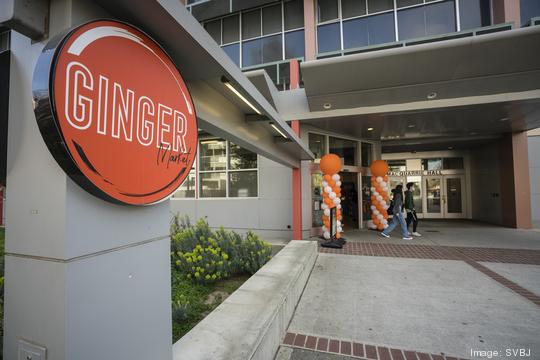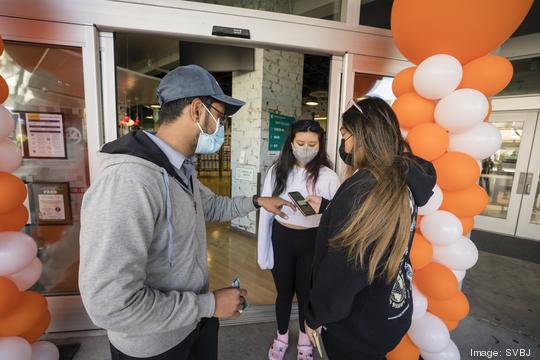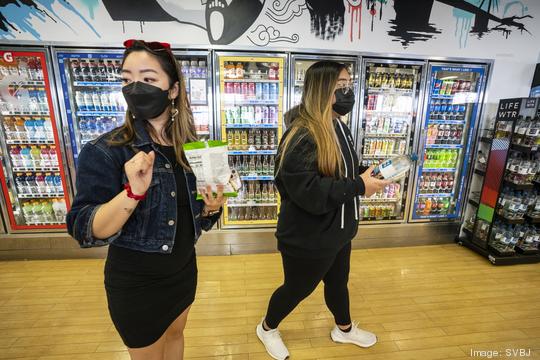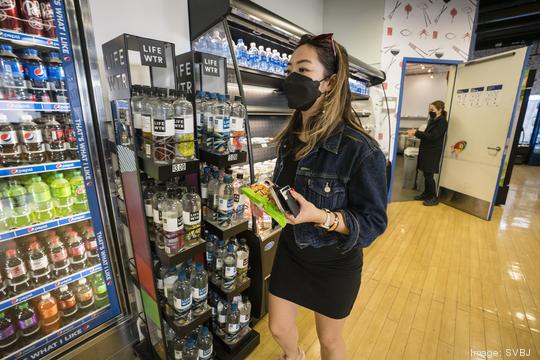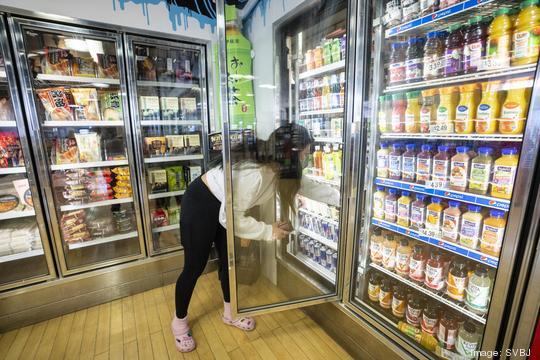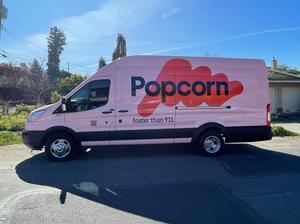Amazon Inc. hasn't yet opened up one of its checkout-free Amazon Go stores in the South Bay, but you can now get a similar shopping experience at San Jose State University.
SJSU's Ginger Market on Monday added a new payment system that allows customers to walk out with their purchases without having to pull out their wallets, scan any items or interact with a cashier. Provided by Standard Cognition Corp., the system simply requires customers to swipe their phones against a sensor when they enter the store.
Standard's technology keeps track of the items customers pick up, tallies up their purchases, charges the payment card they have on file and sends them an electronic receipt within about five minutes of when they leave the store.
"We make it so that they can have better customer service, because staff isn't worried about doing transactions," said Michael Suswal, Standard's chief business officer and one of its seven co-founders.
Most of Standard's co-founders worked together at the U.S. Securities and Exchange Commission developing ways to use machine learning to detect fraud and market manipulation. While still at the SEC, the group started talking about forming a startup focused on another kind of artificial intelligence technology, machine vision. They decided to develop a service for the retail industry, forming Standard, also known as Standard AI, in 2017.
Much like the technology used in Amazon Go stores, Standard's system is built around cameras. Its machine vision technology can detect individual customers, identify the products they pick up and tell when the customers move about the store or put items back. According to the San Francisco company, its system was built with privacy in mind; it doesn't use facial recognition to identify particular patrons.
Standard is focusing on colleges
The debut of its system in San Jose comes as a result of its partnership with Chartwells Higher Education Dining Services. Legally known as Compass Group USA Inc., Chartwells operates stores and dining facilities at colleges around the nation.
Standard sees college-based stores as a target market, because of students' typical openness to adopting new technologies. Its service is already in use at stores on colleges in Texas, North Carolina, Arizona and Massachusetts.
"We're getting more requests from more universities all the time," Suswal said. "It's really convenient for students who are running behind, have a really short run between classes ... It's a great demographic for us to be doing this with."
Standard and Amazon aren't the only companies developing checkout free systems. Another is Grabango Co. That Berkeley-based startup raised a $39 million Series B round last year.
For its part, Standard has raised $236 million so far, according to PitchBook Data, including $150 million in a Series C round last year.
Now that Ginger Market has Standard's technology installed, customers need to download the Boost Mobile Food Ordering app to be able to shop and pay for their goods. When Ginger debuted its new payment system Monday, store employees helped customers download the app and showed them how to then scan their phones when they entered.
Its service wasn't so convenient for some
The new system got mixed reviews.
Roselle Lagmay was familiar with Amazon Go, so she understood the concept and potential convenience of a checkout-free sytstem before she entered Ginger Market. But having to download an app before entering the store was not particularly convenient, said Lagmay, an SJSU student.
"If you wanted to get something before class, and you didn't know you had to get the app, it's kind of frustrating that you have to go download it and go through that experience," Lagmay said. Still, she added, "It's really convenient when you have the app and you're ready to go and get something and get out and not be in a line."
Jennifer Nguyen likewise didn't like having to download an app before entering the store. And she ran into another problem. While the Boost Mobile app said it accepted Apple Pay, she couldn't get Apple's payment service to work in the app.
"I happened to have my card on me, and so that's how we could use it, but that wasn't fun," said Nguyen, also an SJSU student. "But I got my beef jerky, so I'll be OK."
At least right now, because customers have to download an app before entering the store, Ginger Market's new payment system is less convenient that its old, traditional checkout one, said Giorgina Laurel. But as more and more people install and configure the app, the store's new system should become more convenient to more people, she said.
"I guess it's kind of cool, because you can just walk in and walk out with what you're going to buy," said Laurel, another SJSU student. She continued: "It's just going to be a little bit of adjusting to it."
